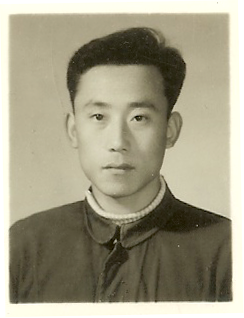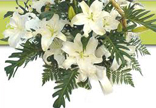    
赵兴, 北京通州人。 1965年毕业于南开大学外文系英语专业。 毕业后分配到北京第二外国语学院, 后因家庭原因调到中国民航大学任教授、外语系系主任。赵兴 於2013年1月15日不幸去世,享年75岁。 赵兴同学去世后刘士聪、崔永禄同学曾前往吊唁;吴则田同学去家中表示慰问。
赵兴 1965
今晨接赵兴夫人电话;赵兴虽经几次住院治疗,还是未能留住他的生命。他于昨晚不幸逝世。享年75岁。
赵兴出身农民家庭。他为人朴实忠厚、谦虚低调,生活俭朴,学习勤奋,有深厚的语言功底。走上工作岗位后,他那认真负责的工作态度和肯于奉献的精神使他担当起民航学院(现中国民航大学)外语系系主任之职责。他的去世让我们失去了一位好同学,让他的学生失去了一位好教授。
他的去世令我们十分悲痛!刘士聪和崔永禄代表我们(我因感冒不便)前去他家进行了吊唁。让我们为他祈祷吧:赵兴老同学一路走好!赵兴老同学安息!
-- 孙毅兵崔永禄
2013年1月16日
               
我心诚自恸,非独为君悲
-- 纪念赵兴同学
吴则田
赵兴走了,在天津武警医院安详地闭上了眼,在家人沉痛的泪光中,永远地闭上了眼。
两个多月前,我和65届的老同学(常耀信王蕴茹夫妇,刘仕聪谷启楠夫妇和崔永禄孙毅兵夫妇)一行七人去看望了病中的赵兴,那时的他身体消瘦,精神却还好,我们说了一些勉励的话,并期待着奇迹的出现,然而两个月之后,我们等来的不是奇迹,而是赵兴同学病逝的噩耗。他走了,时间静止于2013年1月15日23点30分。
时间静止,思绪却慢慢张开翅膀,我们想起了在南开大学一起上学的时光。那时的我们,正青春年少,时代赋予我们的是高昂的政治热情和低廉的物质生活,艰苦朴素是那个时代的生活旋律,赵兴同学的家境相对更艰辛一些,所以他的生活尤其简朴。他不善言辞,说话也不多,他在轰轰烈烈的政治大潮中沉默,他在将将满足温饱的生活中发愤努力。灰暗半旧的衣着朴实地包裹着他年轻的身体,求知的种子却在里面蓬勃成长,青葱的南开校园,到处都留下了他读书的身影。
墙角数枝梅,凌寒独自开。这就是我们熟悉的赵兴同学。他避开所有的世事纷争,安静地学习,安静地成长,安静地把自己的青春年华绽放成一道无需他人喝彩的风景。
毕业之后,他也秉承了“与世无争,专心学术”的一贯风格。
我们大多数同学毕业后的去向,是全国各大院校当老师,赵兴去了北京第二外国语学院。而后在1980年,又调到了位临天津机场的中国民航学院(现名中国民航大学)。在这两所大学的教学生涯中,赵兴勤勤恳恳,专心致志,把平生所学深入浅出地讲解出来,有学生回忆起学校生活时说:听赵老师讲课是一种享受,像易中天讲《三国》,像于丹讲《论语》,原本很枯燥的内容经他一讲就活了。是的,这就是赵兴,平时依然是说话不多,但一上讲台就如鱼得水,谈吐自如。
赵兴出过一本书,叫《英语动词的时与体》,说实话,这本书学术性很强,得到了学术专家的好评,但在功利英语大行其道的当时(现在更甚),是没什么市场的,因而购者寥寥,但是他却时常捧着这本书看,心里很满足的样子。多提一句的是:这本书是在他任民航大学外语系主任的时候写的,因为写作需要专心,为此他竟然辞去了系主任这个职位。在他心里,学术的成就比挣钱、做官要重要得多。
有一年,赵兴的心情有些低落,因为没有在第一批评上教授。 赵兴的专业水平出色,教学也很棒,并在国家一级刊物上发表过几篇论文,但是没有评上。家里人说,这件事其实怪他自己,评委里有他的同学,只要他打个电话说一声,应该是没什么问题的,但是他没有。第二年,他又发表了两篇论文,条件百分之百合格了,才当上教授。他说,这个教授他当得硬气,不掺一丝假。清高就是他的标签,也是我们这一代人的标签。
赵兴从北京二外调到天津的民航学院,这件事说起来是有故事的。1980年,民航学院刚刚建院不久,师资力量匮乏,急需引进一批有教学能力的老师,就是那个时候接触了赵兴,民航学院开出的条件只有一个:解决配偶及子女的城市户口。而后北京二外得知了这个消息,鉴于赵兴的专业水平和教学能力,二外的领导做了极力的挽留,并向高教部尽量为赵兴争取优厚条件,但由于当时的国情,一些事情终究无法办成,所以最终开出的条件是:解决配偶的城市户口并安排工作(但不包含子女,子女的城市户口日后再择机争取),并送赵兴去美国留学深造。这只是两所院校开出的明面条件,隐含的条件还有:当时的民航学院是一个专科学校,比二外低一级;赵兴在二外已经有了较深的基础,深得院领导的认可,而到了民航学院就得从头开始;赵兴的爱人孟姐当时是民办教师,还有半年就转正了(这是后来得知的,之前只知道有转正希望)。这种情况下,赵兴毅然选择了民航学院,因为他重点考虑的是两个孩子的户口问题。孟姐本来想再过一段时间,等转正之后再去,但为了照顾一双儿女,也随全家迁到了天津。而后的故事就不太如意了:赵兴的长处是学术水平和教学能力,但却因条件所限难以施展才华,因而一直没有太多的机会,再加上他那清高、不肯求人的性格,孟姐一直也没有得到一份正式工作,直到今天。多说一句,孟姐年少时是很优秀的,也很上进,因而这一结局让她的一生郁郁不得志。可以说,赵兴和孟姐做出了职业生涯的巨大牺牲,只是为了确保子女的幸福。好在,这一双儿女都顺利地大学毕业,且事业有成,这对赵兴和孟姐算是最大的安慰。
我们这一代人,经历了太多的事情,与世无争的态度、执着的学术信念、为亲人牺牲的精神,就是属于以赵兴同学为代表的我们这一代人的品质特征,赵兴走了,这世间又少了一份这种品质,我心诚自恸,非独为君悲。我们的故事,也都将凝化成一枚枚书签,夹进历史的长卷中。
祭奠赵兴同学,也祭奠着我们一同走过的岁月。然而年华已尽,逝者长已。就让我们每个生者,珍惜今天,珍惜,我们只有一次的生命。
(2013.1.20)
              
惊闻赵兴同学不幸去世的消息,十分难过。赵兴学习刻苦,生活俭朴,为人忠厚老实,行事不事张扬,待人十分热情诚恳,与世无争。我为我们班又失去一位好同学而感到难过,让我们更加珍惜老同学间的友谊吧,大家多多保重!并在此通过互联网向赵兴家属表示哀悼和慰问。
-- 维树 于海口
              
惊闻赵兴老同学离去,不胜悲痛。2010年我们还欢聚南开,那时他还好好的,才过几年人已不在,他走的太早了。看着我们共同参加南开90周年校庆的照片(那还是我老伴照的呢),我不禁回想起我们在校的时光。我和赵兴同居一室,经常在寝室学习。他不言不语,专心读书。读到精彩的地方,情不自禁地笑出声来并赞美说“真有意思。”他对学问有一股强烈的追求。这种精神十分难得,这也是后来他业绩突出的原因之一。
祝愿赵兴一路走好。
-- 张连泰
              
从孙毅兵那儿听到赵兴同学去世的消息,我的心情久久不能平静。想想他在上大学期间似乎一直跟我在一个小班。他那优美的语音语调,抑扬顿挫的英语诵读,令人记忆犹新。他是一个沉稳内敛,踏实肯干,朴素善良,不求名利的好同学,虽然在学期间没能入团,但工作后直接入了党,可见其优秀品质及进取精神。本应在他患病期间前去看望,没想却还没等成行他便已去,这成了我的终生遗憾!借此网站向赵兴夫人及儿女致以诚挚的慰问,望他们节哀,保重。望我们大家都把身体健康放在第一位,在有生之年抓紧联系,继续发展五年同窗的情谊,让生活更加充实有趣!
-- 朱柏桐
              
惊闻赵兴去世的消息,十分悲痛。我们班又失去一位好兄弟。记得我俩同岁,在校时我们是好朋友,毕业后曾多年通信。在此通过校友网站向赵兴表示沉痛的哀悼并向其家属表示慰问!我们都已是古稀之年,望大家多保重!
-- 老班长唤群
              
获悉赵兴同学仙逝的消息,深感哀痛。他大学时代质朴的形象深深地印在我的脑海中。
请代为向他的家人表示诚挚的慰问,请他们节哀、保重。
-- 刘蜀永
2013年2月2日 于香港
              
惊悉赵兴同学不幸逝世,深感痛惜。请向他的家人转致诚挚的慰问。
-- 65届老同学 谷恒东
2013,2,2
              
得知赵兴过世,我们心里十分难过。开始时他是中风,我们几位老同学2011年去看望他时见他精神还好,只是行动有些不便, 家人照顾也很周到。后来2012年再去时,得知他得了肺部感染,由此引起肺液渗出,几次抽液都不能除根。我们大家极其担心,但感到束手无策,只是尽力劝慰他振作精神。万万没有想到这竟是我们和他的最后一次见面。噩耗传来,久久不能相信,他竟这么快地走了,让我们感到这么措手不及。人生无常,我们祝同窗好友赵兴一路走好,我们会永远怀念你。
-- 王蕴茹 常耀信
              
Dear OurEnglish Customer Service,
Thank you for your prompt reply. I am deeply saddened to hear the devastating news of Zhao's departure. The first time I saw his photo on your website, I couldn't recognize him; neither could the other fellow teachers of his. We worked together for fifteen long years and he struck me as being sincere, low-profiled, and humble. I was particularly impressed by his native-like command of the English language, his professional competence, and his dedication to teaching, to such an extent that he was widely recognized as a valuable asset to the department of which he was a member. Life is really short. A number of years ago I accessed your website and tried to use it to get connected with him. Unfortunately, I didn't receive any response and we failed to pick up where we had left off thirty years ago. I will certainly read the recommended website set up in his memory. And hopefully, Wenmei will get back to me. Your assistance is again deeply appreciated.
Regards,
Zhang Bingyi (原北二外赵兴教授的同事)
San Francisco, USA
04/16/2014
              
惊悉赵兴老同学不幸去世的消息,深感悲痛。我在南开大学五年期间一直与赵兴同居一室。他那朴实无华、认真求实的思想和工作作风,他刻苦学习的精神,给我们留下了深刻的印象。望家人节哀保重,赵兴将永远活在我们的心中!
-- 高东山
01/16/2013
              
Hi, Dear Donshan,
We are all fine so far. We have not yet found mortal illnesses, but we are in what is called sub-health conditions and small illnesses are many.
Thank you very much for your intention to convey our greetings to all the Nankai alumni on our behalf. We did miss something in our previous letter to you. When we were writing the letter, we forgot to express our condolences to the families and relatives of our schoolmates Mr. Zhao Xing and Mr. Zhao Hongbo. If you are kind enough to post our letter of greetings and thanks in "校友来信” under "校友之窗", will you please add the following short paragraph: "Meanwhile, we are greatly shocked to hear the passing away of our schoolmates Mr. Zhao Xing and Mr. Zhao Hongbo. Their images in the early days still remain vivid in our minds. Please convey our griefs and condolences to their families and relatives on our behalf. " before "Thanks again".
Ke Wenli & Hou Meixue
2/3/2013
|
赵兴教授生前照片
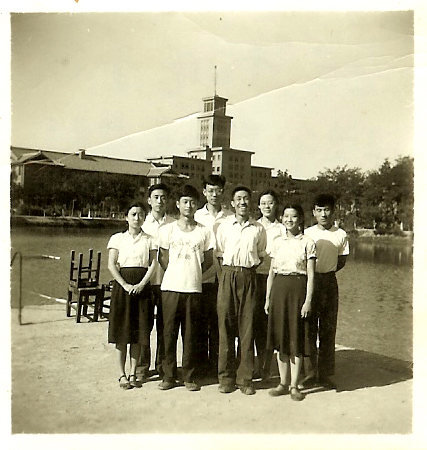
分组毕业照后排左起第一人为赵兴 1965。
前排左起:朱柏桐杨俊起李维树谷启楠;后排左起其他人:李明德蔡文美王陞印
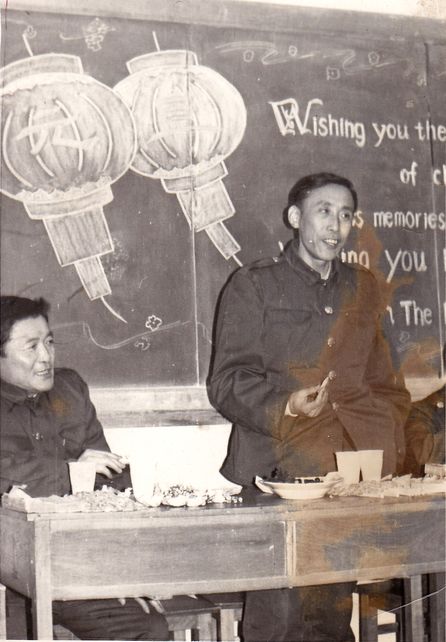
刚来民航学院不久的新年联欢会上,赵兴正在出一个英文谜语,就叫“与高清正
在民航学院乘务班元旦联欢会上,1982年”。 左起第一人高清正教授。
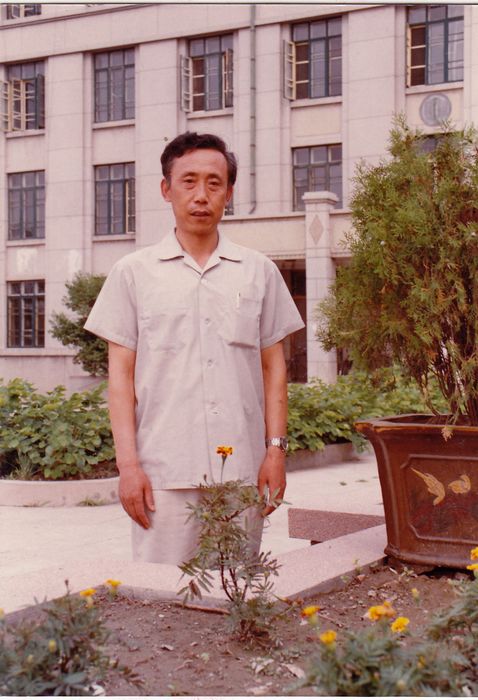
民航学院老办公楼前
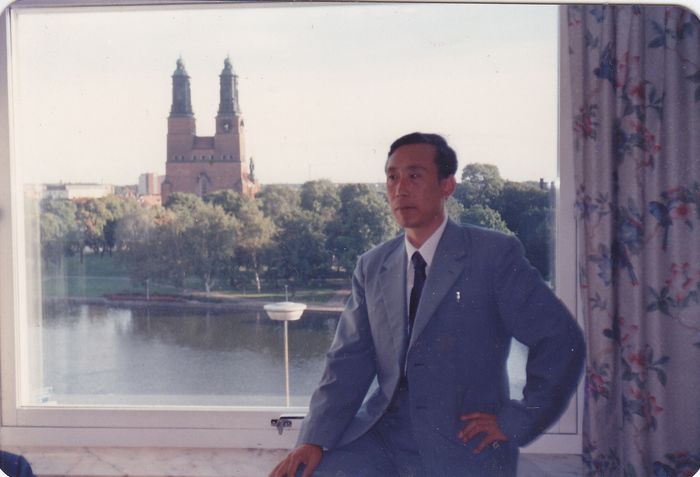
在瑞典,1988年
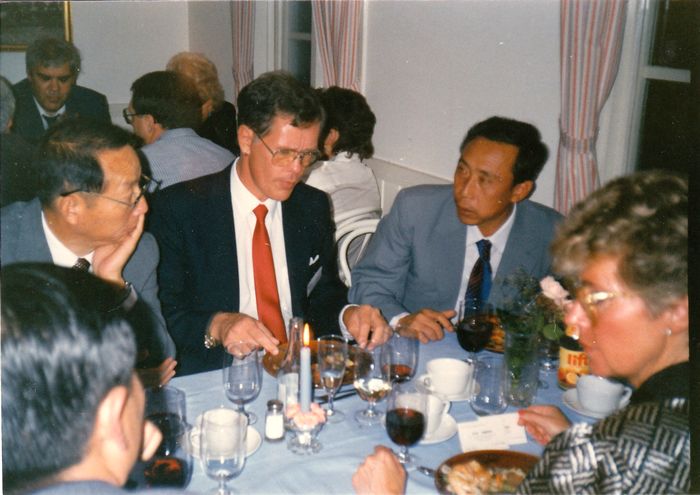
在瑞典,1988年

在瑞典,1988年
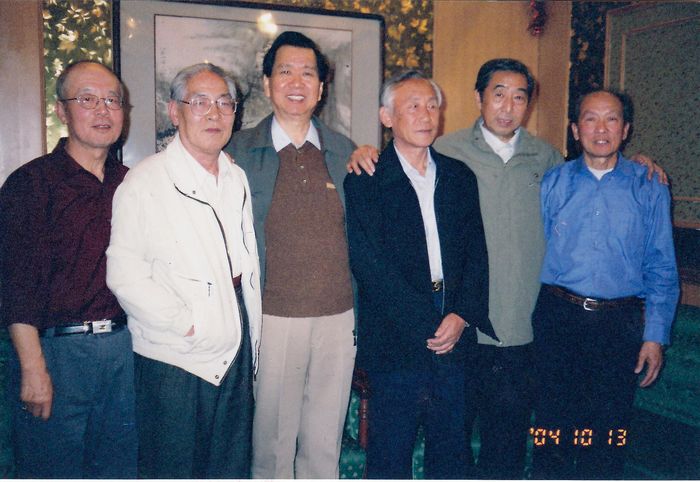
2004年10月13日在南开园与老同学团聚。左起:李广然刘焕群常耀信赵兴宫自强徐基荣
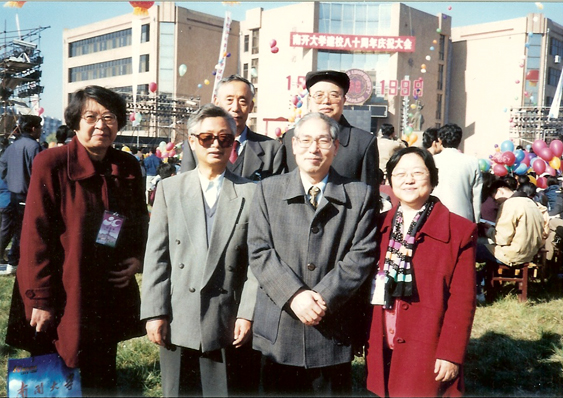
后排左起第一人为赵兴 1999,天津。前排左起:孙毅兵杨俊起刘焕群贺新(贺曼丽);后排第二人为张连泰。
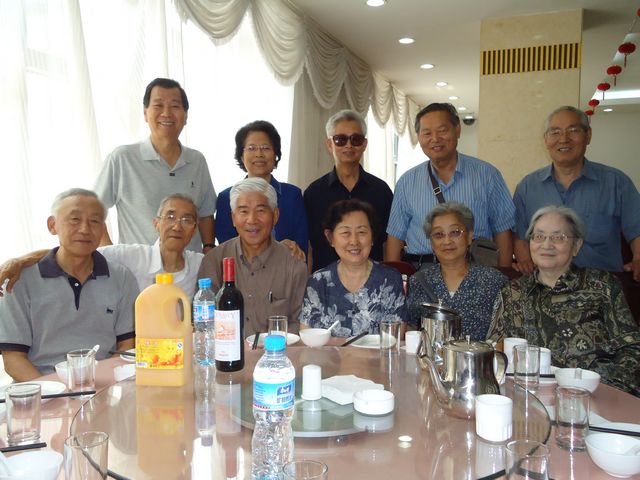
前排左一为赵兴,2010年。 前排左起其他人:李维树高东山马振铃朱柏桐许荣仙;
后排左起:常耀信王蕴茹杨俊起吴则田刘焕群
  
   
|
    
|
American Poet Henry Wadsworth Longfellow (1807-1882) |
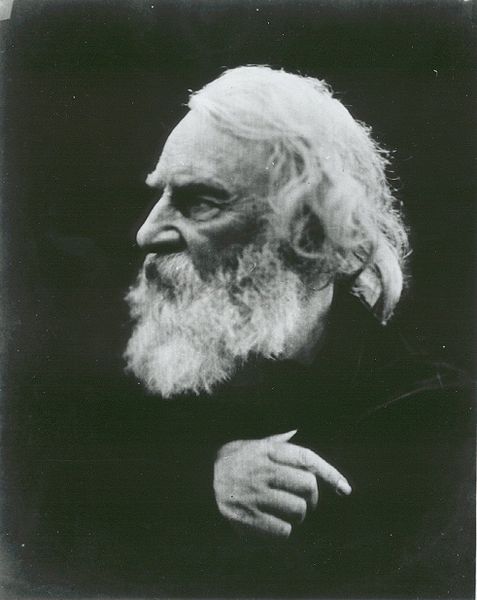
Longfellow in 1868 by Julia Margaret Cameron
(This work of art is in the public domain.)
Henry Wadsworth Longfellow (February 27, 1807 – March 24, 1882) was an American educator and poet whose works include "Paul Revere's Ride", The Song of Hiawatha, and "Evangeline". He was also the first American to translate Dante Alighieri's The Divine Comedy and was one of the five members of the group known as the Fireside Poets.
Longfellow was born in Portland, Maine, then part of Massachusetts, and studied at Bowdoin College. After spending time in Europe he became a professor at Bowdoin and, later, at Harvard College. His first major poetry collections were Voices of the Night (1839) and Ballads and Other Poems (1841). Longfellow retired from teaching in 1854 to focus on his writing, living the remainder of his life in Cambridge, Massachusetts, in a former headquarters of George Washington. His first wife, Mary Potter, died in 1835 after a miscarriage. His second wife, Frances Appleton, died in 1861 after sustaining burns from her dress catching fire. After her death, Longfellow had difficulty writing poetry for a time and focused on his translation. He died in 1882.
Longfellow predominantly wrote lyric poems which are known for their musicality and which often presented stories of mythology and legend. He became the most popular American poet of his day and also had success overseas
 
Paul Revere's Ride (The Landlord's Tale)
by Henry Wasworth Longfellow |
|
| |
Listen, my children, and you shall hear
Of the midnight ride of Paul Revere,
On the eighteenth of April, in 'Seventy-five;
Hardly a man is now alive
Who remembers that famous day and year.
He said to his friend, "If the British march
By land or sea from the town to-night,
Hang a lantern aloft in the belfry arch
Of the North Church tower as a signal light, --
One, if by land, and two, if by sea;
And I on the opposite shore will be,
Ready to ride and spread the alarm
Through every Middlesex village and farm,
For the country folk to be up and to arm."
Then he said, "Good night!" and with muffled oar
Silently rowed to the Charlestown shore,
Just as the moon rose over the bay,
Where swinging wide at her moorings lay
The somerset, British man-of-war;
A phantom ship, with each mast and spar
Across the moon like a prison bar,
And a huge black hulk, that was magnified
By its own reflection in the tide.
Meanwhile, his friend, through alley and street,
Wanders and watches with eager ears,
Till in the silence around him he hears
The muster of men at the barrack door,
The sound of arms, and the tramp of feet,
And the measured tread of the grenadiers,
Marching down to their boats on the shore.
Then he climbed the tower of the Old North Church
By the wooden stairs, with stealthy tread,
To the belfry-chamber overhead,
And startled the pigeons from their perch
On the sombre rafters, that round him made
Masses and moving shapes of shade, --
By the trembling ladder, steep and tall,
To the highest window in the wall,
Where he paused to listen and look down
A moment on the roofs of the town,
And the moonlight flowing over all.
Beneath, in the churchyard, lay the dead,
In their night-encampment on the hill,
Wrapped in silence so deep and still
That he could hear, like a sentinel's tread,
The watchful night-wind, as it went
Creeping along from tent to tent,
And seeming to whisper, "All is well!"
A moment only he feels the spell
Of the place and the hour, and the secret dread
Of the lonely belfry and the dead;
For suddenly all his thoughts are bent
On a shadowy something far away,
Where the river widens to meet the bay, --
A line of black that bends and floats
On the rising tide, like a bridge of boats.
Meanwhile, impatient to mount and ride,
Booted and spurred, with a heavy stride,
On the opposite shore walked Paul Revere.
Now he patted his horse's side,
Now gazed at the landscape far and near,
Then, impetuous, stamped the earth,
And turned and tightened his saddle-girth;
But mostly he watched with eager search
The belfry-tower of the Old North Church,
As it rose above the graves on the hill,
Lonely and spectral and sombre and still.
And lo! As he looks, on the belfry's height
A glimmer, and then a gleam of light!
He springs to the saddle, the bridle he turns,
But lingers and gazes, till full on his sight
A second lamp in the belfry burns!
A hurry of hoofs in a village street,
A shape in the moonlight, a bulk in the dark,
And beneath, from the pebbles, in passing, a spark
Struck out by a steed flying fearless and fleet:
That was all! And yet, through the gloom and the light,
The fate of a nation was riding that night;
And the spark struck out by that steed, in his flight,
Kindled the land into flame with its heat.
He has left the village and mounted the steep,
And beneath him, tranquil and broad and deep,
Is the Mystic, meeting the ocean tides;
And under the alders, that skirt its edge,
Now soft on the sand, now loud on the ledge,
Is heard the tramp of his steed as he rides.
It was twelve by the village clock
When he crossed the bridge into Medford town.
He heard the crowing of the cock,
And the barking of the farmer's dog,
And felt the damp of the river fog,
That rises after the sun goes down.
It was one by the village clock
When he galloped into Lexington.
He saw the gilded weathercock
Swim in the moonlight as he passed,
And the meeting-house windows, blank and bare,
Gaze at him with a spectral glare,
As if they already stood aghast
At the bloody work they would look upon.
It was two by the village clock
When he came to the bridge in Concord town.
He heard the bleating of the flock,
And the twitter of birds among the trees,
And felt the breath of the morning breeze
Blowing over the meadows brown.
And one was safe and asleep in his bed
Who at the bridge would be first to fall,
Who that day would be lying dead,
Pierced by a British musket-ball.
You know the rest. In the books you have read,
How the British Regulars fired and fled, --
How the farmers gave them ball for ball,
From behind each fence and farm-yard wall,
Chasing the redcoats down the lane,
Then crossing the fields to emerge again
Under the trees at the turn of the road,
And only pausing to fire and load.
So through the night rode Paul Revere;
And so through the night went his cry of alarm
To every Middlesex village and farm, --
A cry of defiance and not of fear,
A voice in the darkness, a knock at the door,
And a word that shall echo forevermore!
For borne on the night-wind of the Past,
Through all our history, to the last,
In the hour of darkness and peril and need,
The people will waken and listen to hear
The hurrying hoof-beats of that steed
And the midnight message of Paul Revere |
|
An April Day
by Henry William Wadsworth |
|
| |
When the warm sun, that brings
Seed-time and harvest, has returned again,
'T is sweet to visit the still wood, where springs
The first flower of the plain.
I love the season well,
When forest glades are teeming with bright forms,
Nor dark and many-folded clouds foretell
The coming-on of storms.
From the earth's loosened mould
The sapling draws its sustenance, and thrives;
Though stricken to the heart with winter's cold,
The drooping tree revives.
The softly-warbled song
Comes from the pleasant woods, and colored wings
Glance quick in the bright sun, that moves along
The forest openings.
When the bright sunset fills
The silver woods with light, the green slope throws
Its shadows in the hollows of the hills,
And wide the upland glows.
And when the eve is born,
In the blue lake the sky, o'er-reaching far,
Is hollowed out and the moon dips her horn,
And twinkles many a star.
Inverted in the tide
Stand the gray rocks, and trembling shadows throw,
And the fair trees look over, side by side,
And see themselves below.
Sweet April! many a thought
Is wedded unto thee, as hearts are wed;
Nor shall they fail, till, to its autumn brought,
Life's golden fruit is shed. |
|
Autumn
by Henry Wadsworth Longfellow |
|
| |
Thou comest, Autumn, heralded by the rain,
With banners, by great gales incessant fanned,
Brighter than brightest silks of Samarcand,
And stately oxen harnessed to thy wain!
Thou standest, like imperial Charlemagne,
Upon thy bridge of gold; thy royal hand
Outstretched with benedictions o'er the land,
Blessing the farms through all thy vast domain!
Thy shield is the red harvest moon, suspended
So long beneath the heaven's o'er-hanging eaves;
Thy steps are by the farmer's prayers attended;
Like flames upon an altar shine the sheaves;
And, following thee, in thy ovation splendid,
Thine almoner, the wind, scatters the golden leaves! |
|
| |
The Cross of Snow
by Henry Wadsworth Longfellow |
|
| |
In the long, sleepless watches of the night,
A gentle face -- the face of one long dead --
Looks at me from the wall, where round its head
The night-lamp casts a halo of pale light.
Here in this room she died; and soul more white
Never through martyrdom of fire was led
To its repose; nor can in books be read
The legend of a life more benedight.
There is a mountain in the distant West
That, sun-defying, in its deep ravines
Displays a cross of snow upon its side.
Such is the cross I wear upon my breast
These eighteen years, through all the changingscenes
And seasons, changeless since the day she died. |
|
The Evening Star
by Henry Wadsworth Longfellow |
|
| |
Lo! in the paintedoriel of the West,
Whose panes the sunken sun incarnadines,
Like a fair lady at her casement, shines
The evening star, the star of love and rest!
And then anon she doth herself divest
Of all her radiant garments, and reclines
Behind the sombre screen of yonder pines,
With slumber and soft dreams of love oppressed.
O my beloved, my sweet Hesperus!
My morning and my evening star of love!
My best and gentlest lady! even thus,
As that fair planet in the sky above,
Dost thou retire unto thy rest at night,
And from thy darkened window fades the light. |
|
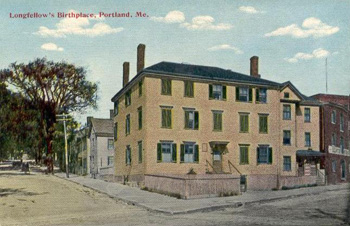
Longfellow's Birth Place in Portland, ME
(This work of art is in the public domain.)
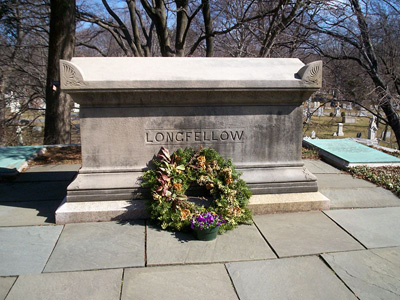
Grave of Henry Wadsworth Longfellow at Mount Auburn
Cemetery in Cambridge, Massachusetts
(The photo is re-used under the terms of GNU Free Documentation License, Version 1.2)
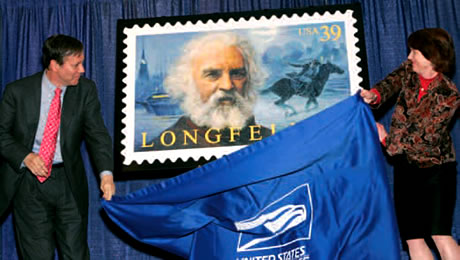
NEA Chairman Dana Gioia and Katherine C. Tobin, member of the USPS Board of Governors, unveil the new U.S. postage stamp in honor of poet Henry Wadsworth Longfellow in 2007
Author:US Postal Service. (This photo is in the public domain.)
 
|

|
| |
|
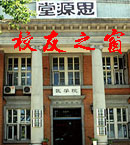

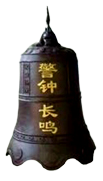
![]()
![]()
![]()
![]()
![]()


